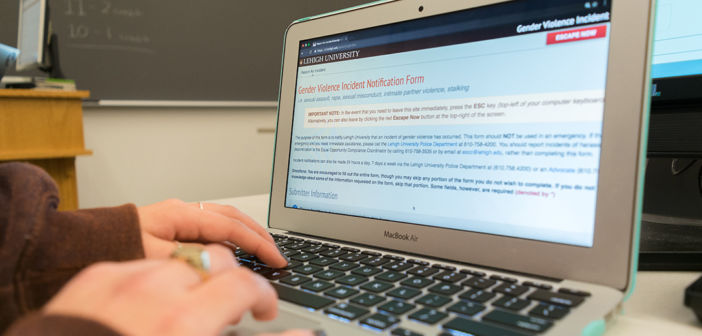Lehigh police and university officials say they know sexual assault is happening at a greater rate than campus statistics indicate, but they call it an underreported crime.
Some survivors, however, have indicated the reporting process and procedures may be discouraging more students from coming forward to report these crimes.
LUPD reported three sexual assaults in 2015, which falls in stark contrast with the national statistic that one in five women will experience sexual assault while at college.
All three reported cases were rapes. LUPD tracks but recorded no incidents of fondling, statutory rape, domestic violence, dating violence, incest, stalking or sex offenses.
If every person who experienced sexual assault at Lehigh reported the crime, the statistic should be closer to 450 women reporting, trusting the one-in-five statistic.
“I will say that sexual assault is probably the most underreported crime,” LUPD Chief Edward Shupp said. “We can only respond to the complaints that we do have, and we don’t get a lot of complaints on it, unfortunately.”
These crime statistics also only reflect crimes that happen within the boundaries of Lehigh’s campus. Bethlehem Police Chief Mark DiLuzio said if a student is sexually assaulted off campus his department will handle the case.
The criminal definition of what is considered sexual assault is a contributing factor to this small number, according to Karen Salvemini, Lehigh’s equal opportunity compliance coordinator.
Salvemini said what she may note as a report in her own records may be different from what the police will count as a crime. The threshold of proof differs between the two entities, as a criminal complaint requires a greater burden of proof.
“What might fit under our policy and what’s considered sexual exploitation or sexual assault under our policy may not rise to that level for the criminal statutes,” she said.
Salvemini said her office has seen an increase in reports since her position was added almost two years ago. Brooke DeSipio, the director of the Office of Gender Violence Education and Support, has noted a similar increase in reports since her office was created three years ago.
Members of the Lehigh community who are sexually assaulted can report and seek help in many ways — reporting to Salvemini or DeSipio, calling the LUPD or BPD, telling a Gryphon or adviser, or filling out an online reporting form.
“I’ll be honest, I’m not sure exactly what (the process) was before I got here,” Salvemini said. “I don’t know that there was a reporting structure, which I think is why this position sort of came about. At least that’s my understanding, before it seemed like different offices were handling different parts, but there was no cohesive way of responding.”
Both Salvemini and DeSipio’s offices keep track of “contacts,” which could include student interactions revolving around complaints, initial conversations of available options or simply seeking resources to help them deal with an incident.
Salvemini’s office deals with issues of discrimination and harassment as well as gender violence. DeSipio’s office focuses on gender violence but may be working with students who were assaulted outside of Lehigh. Therefore, the number of contacts is not reflective of just sexual assaults at Lehigh alone, which is why it can be difficult to report out to the community.
Salvemini is in the process of putting together reporting numbers from the past year to share with the campus community. She said her office received more than 130 contacts last year. DeSipio said hers received around 50 contacts.
Chris Mulvihill, the interim associate dean of students who works in the Office of Student Conduct and Community Expectations, said his office does not keep statistics specifically for sexual assault.
Some sexual assault survivors are discouraged by the fact that the only visible sexual assault statistics have been fewer than 10 per year over the past three years.
Sophia, who requested to be identified by a pseudonym, was sexually assaulted at Lehigh and reported her assault via the online gender violence reporting form.
“I think most reasonable people will say that they know this is an issue, but if you go online and you look at crime statistics, there is nothing there,” she said.
She said she reported her assault because she wanted others to be aware of incidents like this occurring on Lehigh’s campus. She worked with DeSipio and pursued a conduct case against her assailant with Mulvihill’s office, which ultimately did not end with any sanctions for the perpetrator.
In the end, she said she wishes she hadn’t reported.
“I understand that unless you literally have a rape kit — and even in those cases — not all of the time does that even have justifiable evidence,” Sophia said. “But it’s kind of like, when will there ever be enough for them to do something?”
Given the fact that some cases do not always meet the burden of proof needed for a student to receive university sanctions, DeSipio said survivors sometimes are afraid and fear stigma when reporting to the university.
Mulvihill said the question is not whether an incident happened or not, it’s whether what happened violated the code of conduct or not. He said even if the outcome isn’t necessarily what somebody wants it to be doesn’t mean they were not believed.
“I want people to feel like that’s a good option — to go through that process, to see if somebody should be disciplined for their behavior, and if they should be, have that implemented,” Salvemini said. “At the same time, I don’t want everyone to think that every case is going to turn out the way that they want it.”
DeSipio said sometimes there are cases where one survivor coming forward gives others with similar experiences the confidence to come forward and report. She said more visible statistics at Lehigh could potentially have a similar effect.
“I do think if more people were coming forward and reporting, and that was out there on our campus, like, ‘Oh, it’s OK to talk about this,’ I do think again, hypothetically, based on what we see in other cases, that it would encourage folks to come forward,” DeSipio said.
But even some of the survivors who have gone through the process are not always happy with the end result.
Tiffany, who requested to be identified by a pseudonym, was sexually assaulted at Lehigh and reported her assault to LUPD. After reporting, she was sent to the hospital in an ambulance.
“I really just wanted them to lay out options for me,” she said. “I wanted them to give me a choice in the matter — I didn’t have any choice. I wouldn’t have chosen to go to the hospital in the first place, because I knew I wouldn’t have taken the test. But they didn’t let me choose.”
A detective on her case eventually found her assailant but was not able to pursue anything conclusively because Tiffany did not have a rape test conducted. She said she regretted reporting her assault and would not do it again.
“All I got out of it was not being able to go to a fraternity anymore because they all knew my face, and paying $1,200,” she said.
Both Salvemini and Mulvihill said there are no winners when it comes to these processes.
“If they feel safe, if they want to pursue a conduct case, we have a fair process that will allow people to do that,” Mulvihill said. “It’s as fair of a process as we can develop right now, and in any of those situations the result might not be what you want it to be.”
The university tries to use a fair and equitable process that looks at the facts of the case, but the process is not always as emotionally supportive as a survivor may initially expect.
“It is never going to feel good,” DeSipio said. “You had a traumatic experience and going through a criminal or university process is not going to provide justice or closure. That is a lifelong experience.”
The way a survivor experiences the reporting process may end up having an impact on the healing process.
“It’s terrible to say, but I think my situation was lucky in the grand scheme of all of those, so I was OK with it, and after two weeks I was fine,” Sophia said. “But for other people it could be earth-shattering.”






Comment policy
Comments posted to The Brown and White website are reviewed by a moderator before being approved. Incendiary speech or harassing language, including comments targeted at individuals, may be deemed unacceptable and not published. Spam and other soliciting will also be declined.
The Brown and White also reserves the right to not publish entirely anonymous comments.
2 Comments
I note with interest that the author of this piece — B&W editor in chief Samantha Tomaszewski also just published this piece:
https://thebrownandwhite.com/2016/12/07/edit-desk-seek-truth-and-report-it/
I note the first line says:
I’m a good reporter, but I’m not a good writer.
She appears to be a better writer than I was eons ago when I came close to failing English 1 and 2 when I was an undergraduate. Then again, that was before grade inflation gave everyone at least a B grade.
But is she a good reporter? I think not.
A good reporter takes nothing at face value and goes out researches what her “reporting” is talking about.
I contend she has failed to do that for this story.
There has been way too much patently dishonest feminist claptrap with regards to sexual harassment and rape on college campuses. Especially the 20% myth.
If Samantha had done her job, she would have found numerous sources that would have trashed much of what she says in this article. For example:
This Factual Feminist series which consists of 49 videos at the moment and provides several that are germane to the phony narrative she presents:
https://www.youtube.com/playlist?list=PLytTJqkSQqtr7BqC1Jf4nv3g2yDfu7Xmd
Of particular interest is this one:
https://www.youtube.com/watch?v=q5XMuTAomNk
These articles provide similar contrasting views to those of the article:
http://www.city-journal.org/html/campus-rape-myth-13061.html
http://www.mindingthecampus.org/2015/03/the-rape-epidemic-on-campus-does-not-exist/
The pro Hillary Clinton whiners who have been traumatized by Trump’s election should also take a look at what the Factual Feminist says in this video:
https://www.youtube.com/watch?v=lIJNJHejPfE
The question that should be asked about this article is whether the author is a factual feminist or fictional reporter?
It’s insane and hilariously ironic how TOMASZEWSKI uses “Sophia” as an example of the ‘flawed’ reporting system for rape. This is a case in which she attempted to press charges against her ‘assailant’ which resulted in NO disciplinary action at all from the university (which by the way goes out of its way to screw over its own students, so you better believe they’d love a chance to screw over some alleged rapist) and deductively NO legal action from the state of PA. Yet TOMASZEWSKI insinuates that the reason for NO action by either Lehigh or the state against the assailant is that the reporting system is flawed. Maybe, just maybe, it’s because the case did not warrant any action due to “Sophia” lying or exagerating or whatever other reason. Maybe, just maybe, this isn’t a perfect example for liberals such as TOMASZEWSKI to cram this individual story into their set ‘oppressed’ scenario and reenforce a false narrative.
Women such as “Sophia” go out of their way to try to ruin some innocent guys life by getting him suspended or expelled from the university or going through the legal system and ending up with articles written about them which essentially kill their career opportunities. Sophia says, “after two weeks I was fine.” If this was a serious assault I HIGHLY DOUBT you’d be “fine” after “two weeks.” Yet, she goes and tries to ruin the kids life.
And the Brown and White is reenforcing this kind of disgraceful and unbecoming conduct through this article. Congratulations, you guys are getting more clicks, views, and comments but you’re sacrificing that for any semblance of journalistic ethics. This article coming from the CHIEF EDITOR, in which the article totally lacks journalistic ethics as CLAYTON discussed above, is an absolute disgrace to the publication. Anyone looking to hire TOMASZEWSKI to write for them should read this article; I bet the only ones left would be Mother Jones and the Huffington Post, or Breitbart or INFO WARS for that matter–really any publication which lacks ethics.
https://en.wikipedia.org/wiki/A_Rape_on_Campus